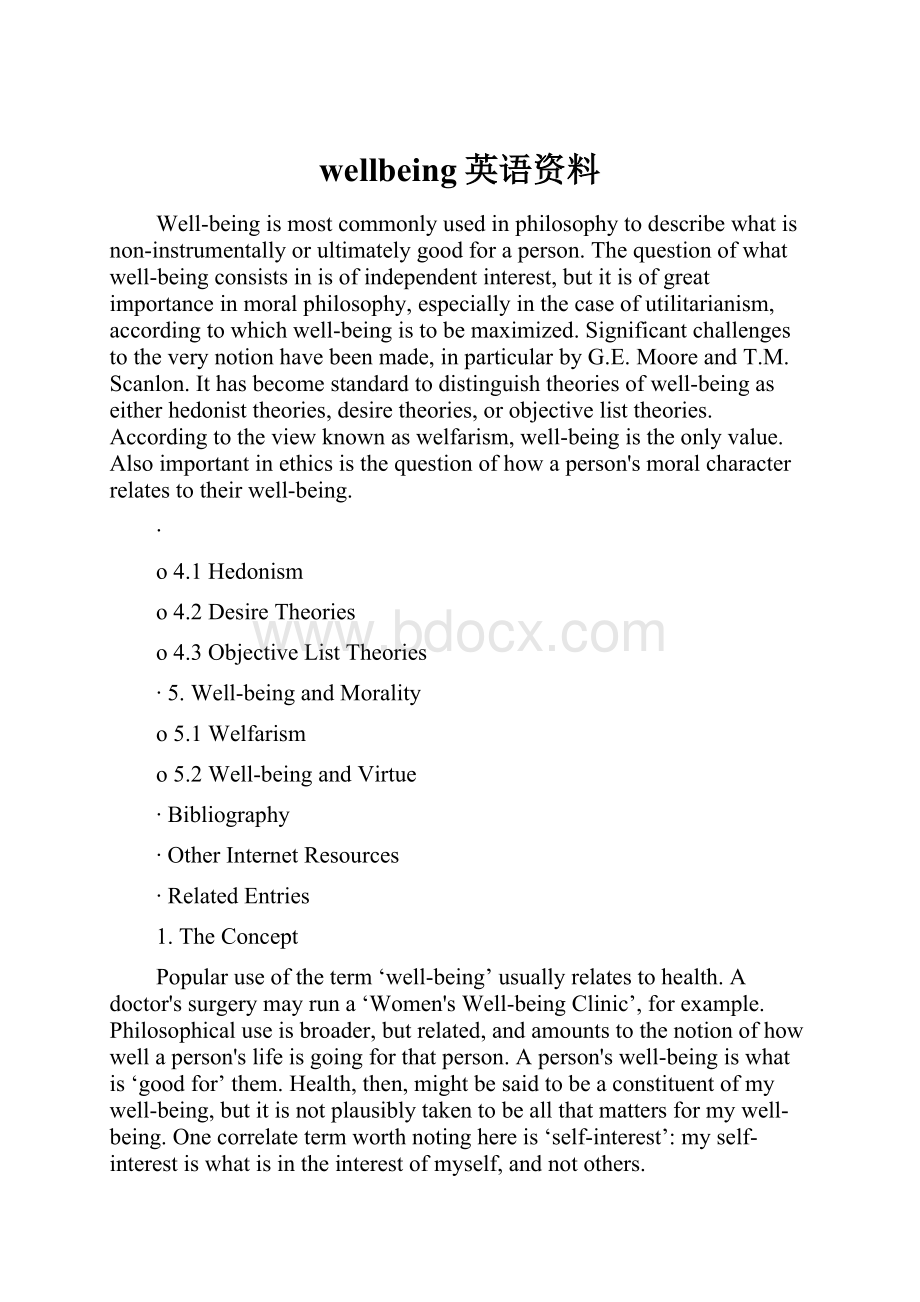wellbeing英语资料.docx
《wellbeing英语资料.docx》由会员分享,可在线阅读,更多相关《wellbeing英语资料.docx(17页珍藏版)》请在冰豆网上搜索。

wellbeing英语资料
Well-beingismostcommonlyusedinphilosophytodescribewhatisnon-instrumentallyorultimatelygoodforaperson.Thequestionofwhatwell-beingconsistsinisofindependentinterest,butitisofgreatimportanceinmoralphilosophy,especiallyinthecaseofutilitarianism,accordingtowhichwell-beingistobemaximized.Significantchallengestotheverynotionhavebeenmade,inparticularbyG.E.MooreandT.M.Scanlon.Ithasbecomestandardtodistinguishtheoriesofwell-beingaseitherhedonisttheories,desiretheories,orobjectivelisttheories.Accordingtotheviewknownaswelfarism,well-beingistheonlyvalue.Alsoimportantinethicsisthequestionofhowaperson'smoralcharacterrelatestotheirwell-being.
∙
o4.1Hedonism
o4.2DesireTheories
o4.3ObjectiveListTheories
∙5.Well-beingandMorality
o5.1Welfarism
o5.2Well-beingandVirtue
∙Bibliography
∙OtherInternetResources
∙RelatedEntries
1.TheConcept
Popularuseoftheterm‘well-being’usuallyrelatestohealth.Adoctor'ssurgerymayruna‘Women'sWell-beingClinic’,forexample.Philosophicaluseisbroader,butrelated,andamountstothenotionofhowwellaperson'slifeisgoingforthatperson.Aperson'swell-beingiswhatis‘goodfor’them.Health,then,mightbesaidtobeaconstituentofmywell-being,butitisnotplausiblytakentobeallthatmattersformywell-being.Onecorrelatetermworthnotinghereis‘self-interest’:
myself-interestiswhatisintheinterestofmyself,andnotothers.
Thephilosophicaluseofthetermalsotendstoencompassthe‘negative’aspectsofhowaperson'slifegoesforthem.Sowemayspeakofthewell-beingofsomeonewhois,andwillremainin,themostterribleagony:
theirwell-beingisnegative,andsuchthattheirlifeisworseforthemthannolifeatall.Thesameistrueofcloselyalliedterms,suchas‘welfare’,whichcovershowapersonisfaringasawhole,whetherwellorbadly,or‘happiness’,whichcanbeunderstood—asitwasbytheclassicalutilitariansfromJeremyBenthamonwards,forexample—tobethebalancebetweengoodandbadthingsinaperson'slife.Butnotethatphilosophersalsousesuchtermsinthemorestandard‘positive’way,speakingof‘ill-being’,‘ill-faring’,or,ofcourse,‘unhappiness’tocapturethenegativeaspectsofindividuals'lives.
‘Happiness’isoftenused,inordinarylife,torefertoashort-livedstateofaperson,frequentlyafeelingofcontentment:
‘Youlookhappytoday’;‘I'mveryhappyforyou’.Philosophically,itsscopeismoreoftenwider,encompassingawholelife.Andinphilosophyitispossibletospeakofthehappinessofaperson'slife,oroftheirhappylife,evenifthatpersonwasinfactusuallyprettymiserable.Thepointisthatsomegoodthingsintheirlifemadeitahappyone,eventhoughtheylackedcontentment.Butthisusageisuncommon,andmaycauseconfusion.
Overthelastfewdecades,so-called'positivepsychology'hashugelyincreasedtheattentionpaidbypsychologistsandotherscientiststothenotionof'happiness'.Suchhappinessisusuallyunderstoodintermsofcontentmentor'life-satisfaction',andismeasuredbymeanssuchasself-reportsordailyquestionnaires.Ispositivepsychologyaboutwell-being?
Asyet,conceptualdistinctionsarenotsufficientlyclearwithinthediscipline.Butitisprobablyfairtosaythatmanyofthoseinvolved,asresearchersorassubjects,areassumingthatone'slifegoeswelltotheextentthatoneiscontentedwithit—thatis,thatsomekindofhedonisticaccountofwell-beingiscorrect.
Whendiscussingthenotionofwhatmakeslifegoodfortheindividuallivingthatlife,itispreferabletousetheterm‘well-being’insteadof‘happiness’.Forwewantatleasttoallowconceptualspaceforthepossibilitythat,forexample,thelifeofaplantmaybe‘goodfor’thatplant.Andspeakingofthehappinessofaplantwouldbestretchinglanguagetoofar.(Analternativeheremightbe‘flourishing’,thoughthismightbetakentobiastheanalysisofhumanwell-beinginthedirectionofsomekindofnaturalteleology.)Inthatrespect,theGreekwordcommonlytranslated‘happiness’(eudaimonia)mightbethoughttobesuperior.But,infact,eudaimoniaseemstohavebeenrestrictednotonlytoconsciousbeings,buttohumanbeings:
non-humananimalscannotbeeudaimon.Thisisbecauseeudaimoniasuggeststhatthegods,orfortune,havefavouredone,andtheideathatthegodscouldcareaboutnon-humanswouldnothaveoccurredtomostGreeks.
Itisoccasionallyclaimedthatcertainancientethicaltheories,suchasAristotle's,resultinthecollapseoftheverynotionofwell-being.OnAristotle'sview,ifyouaremyfriend,thenmywell-beingiscloselyboundupwithyours.Itmightbetempting,then,tosaythat‘your’well-beingis‘part’ofmine,inwhichcasethedistinctionbetweenwhatisgoodformeandwhatisgoodforothershasbrokendown.Butthistemptationshouldberesisted.Yourwell-beingconcernshowwellyourlifegoesforyou,andwecanallowthatmywell-beingdependsonyourswithoutintroducingtheconfusingnotionthatmywell-beingisconstitutedbyyours.TherearesignsinAristotelianthoughtofanexpansionofthesubjectorownerofwell-being.Afriendis‘anotherself’,sothatwhatbenefitsmyfriendbenefitsme.Butthisshouldbetakeneitherasametaphoricalexpressionofthedependenceclaim,orasanidentityclaimwhichdoesnotthreatenthenotionofwell-being:
ifyoureallyarethesamepersonasIam,thenofcoursewhatisgoodforyouwillbewhatisgoodforme,sincethereisnolongeranymetaphysicallysignificantdistinctionbetweenyouandme.
Well-beingisakindofvalue,sometimescalled‘prudentialvalue’,tobedistinguishedfrom,forexample,aestheticvalueormoralvalue.Whatmarksitoutisthenotionof‘goodfor’.TheserenityofaVermeerpainting,forexample,isakindofgoodness,butitisnot‘goodfor’thepainting.Itmaybegoodforustocontemplatesuchserenity,butcontemplatingserenityisnotthesameastheserenityitself.Likewise,mygivingmoneytoadevelopmentcharitymayhavemoralvalue,thatis,bemorallygood.Andtheeffectsofmydonationmaybegoodforothers.Butitremainsanopenquestionwhethermybeingmorallygoodisgoodforme;and,ifitis,itsbeinggoodformeisstillconceptuallydistinctfromitsbeingmorallygood.
2.Moore'sChallenge
Thereissomethingmysteriousaboutthenotionof‘goodfor’.Considerapossibleworldthatcontainsonlyasingleitem:
astunningVermeerpainting.Leaveasideanydoubtsyoumighthaveaboutwhetherpaintingscanbegoodinaworldwithoutviewers,andacceptforthesakeofargumentthatthispaintinghasaestheticvalueinthatworld.Nowitseemsintuitivelyplausibletoclaimthatthevalueofthisworldisconstitutedsolelybytheaestheticvalueofthepainting.Butnowconsideraworldwhichcontainsoneindividuallivingalifethatisgoodforthem.Howaretodescribetherelationshipbetweenthevalueofthisworld,andthevalueofthelifelivedinitfortheindividual?
Arewetosaythattheworldhasavalueatall?
Howcanit,iftheonlyvalueitcontainsis‘goodfor’asopposedtojust‘good’?
Andyetwesurelydowanttosaythatthisworldisbetter(‘moregood’)thansomeotheremptyworld.Well,shouldwesaythattheworldisgood,andissobecauseofthegooditcontains‘for’theindividual?
Thisfailstocapturetheideathatthereisinfactnothingofvalueinthisworldthanwhatisgoodfortheindividual.
ThoughtssuchastheseledG.E.Mooretoobjecttotheveryideaof‘goodfor’(Moore1903,pp.98-9).Moorearguedthattheideaof‘myowngood’,whichhesawasequivalenttowhatis‘goodforme’,makesnosense.WhenIspeakof,say,pleasureaswhatisgoodforme,heclaimed,IcanmeanonlyeitherthatthepleasureIgetisgood,orthatmygettingitisgood.Nothingisaddedbysayingthatthepleasureconstitutesmygood,orisgoodforme.
ButthedistinctionsIdrewbetweendifferentcategoriesofvalueaboveshowthatMoore'sanalysisofmyclaimthatmyowngoodconsistsinpleasure,istoonarrow.IndeedMoore'sargumentrestsontheveryassumptionthatitseekstoprove:
thatonlythenotionof‘good’isnecessarytomakealltheevaluativejudgementswemightwishtomake.TheclaimthatitisgoodthatIgetpleasureis,logicallyspeaking,equivalenttotheclaimthattheworldcontainingthesingleVermeerisgood.Itis,sotospeak,‘impersonal’,andleavesoutofaccountthespecialfeatureofthevalueofwell-being:
thatitisgoodforindividuals.
Indeed,onewaytorespondbothtoMoore'schallenge,andtothepuzzlesabove,istotry,whenappropriate,todowithoutthenotionof‘good’andmakedowith‘goodfor’,alongsidetheseparateandnon-evaluativenotionofreasonsforaction.Thus,theworldcontainingthesingleindividualwithalifeworthliving,mightbesaidtocontainnothinggoodperse,butalifethatisgoodforthatindividual.Andthisfactmaygiveusareasontobringaboutsuchaworld,giventheopportunity.
3.Scanlon'sChallenge
Moore'sbookwaspublishedinCambridge,England,atthebeginningofthetwentiethcentury.Attheendofthesamecentury,abookwaspublishedinCambridge,Mass.,whichalsoposedsomeseriouschallengestothenotionofwell-being:
WhatDoWeOwetoEachOther?
byT.M.Scanlon.
Moore'sultimateaimincriticizingtheideaof‘goodnessfor’wastoattackegoism.Likewise,Scanlonhasanulteriormotiveinobjectingtothenotionofwell-being—toattackso-called‘teleological’orend-basedtheoriesofethics,inparticular,utilitarianism,whichinitsstandardformrequiresustomaximizewell-being.Bu